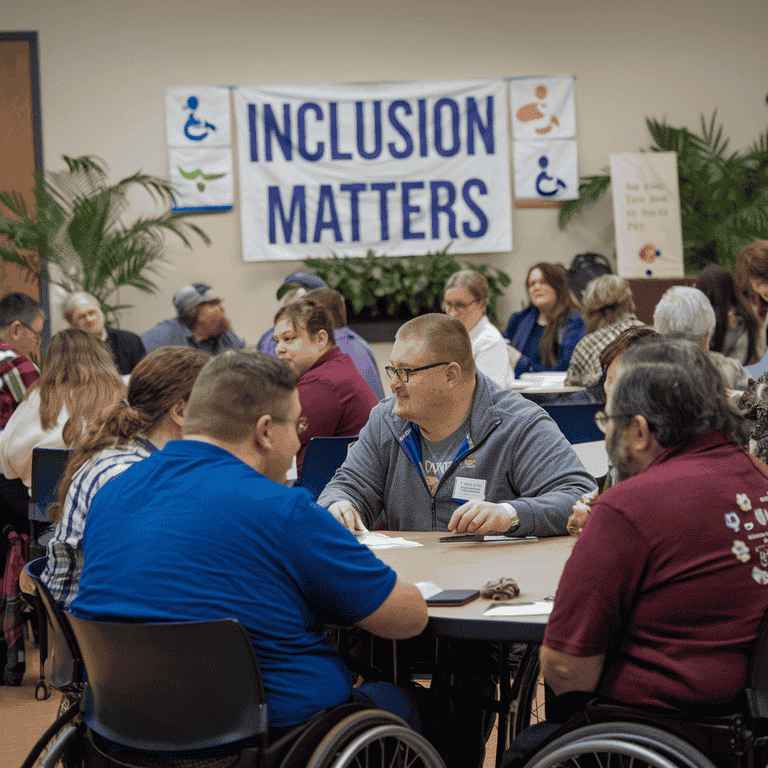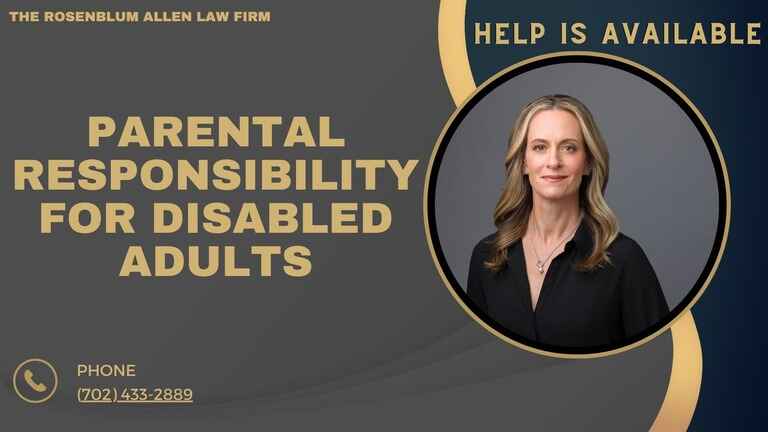Understanding Parental Responsibility for Disabled Adults
Overview of Parental Responsibility for Disabled Adults
Parental responsibility is a crucial concept that extends beyond childhood. For parents of disabled adults, it involves understanding how to provide support while respecting the individual’s rights.
Definition of Parental Responsibility
Parental responsibility refers to the legal rights and duties that parents have concerning their children. When it comes to disabled adults, this responsibility can evolve. It includes:
- Providing necessary care and support.
- Making informed decisions about healthcare, education, and finances.
- Advocating for the disabled adult’s needs.
Understanding this concept helps parents navigate the challenges of their roles as their children transition into adulthood.
Importance of Understanding Parental Responsibility in the Context of Disabled Adults
Recognizing parental responsibility for disabled adults is essential for several reasons:
- Empowerment: It helps parents advocate effectively for their adult children.
- Legal Clarity: It clarifies the rights and responsibilities under the law.
- Support Networks: Understanding these dynamics encourages connections with other families facing similar challenges.
Legal Framework Surrounding Parental Responsibility
Navigating parental responsibility requires knowledge of the legal framework. Laws vary significantly by state, impacting how parents and disabled adults interact.
Relevant Laws and Regulations
Several key laws govern parental responsibilities for disabled adults:
- Americans with Disabilities Act (ADA): Protects disabled individuals from discrimination.
- Individuals with Disabilities Education Act (IDEA): Ensures appropriate education and services for children with disabilities.
- State Laws: Each state has its own regulations regarding guardianship, conservatorship, and parental rights.
These laws shape how parents can support their disabled adult children while making sure their rights are upheld.
Variations in Laws by State or Jurisdiction
It’s essential to understand that laws differ from one place to another. Here are a few examples of how they can vary:
| State | Key Law/Regulation | Notes |
|---|---|---|
| California | Family Code Section 6900 | Allows for parental rights to extend beyond age 18 under specific circumstances. |
| New York | Article 17-A of the Surrogate’s Court Procedure Act | Provides a way for parents to maintain decision-making authority for disabled adults. |
| Texas | Texas Guardianship Law | Allows for limited guardianship options that respect individual autonomy. |
Understanding these variations can help parents make informed decisions.

Types of Disability and Their Implications
Different types of disabilities come with unique challenges and considerations. Understanding these can enhance parental responsibility.
Physical Disabilities
Physical disabilities may limit mobility or require assistance with daily tasks. Parents need to:
- Ensure accessible living environments.
- Help with mobility aids like wheelchairs or scooters.
- Coordinate healthcare services.
Cognitive Disabilities
Cognitive disabilities can affect memory, learning, and communication. Parents might need to:
- Provide tailored educational opportunities.
- Use clear and simple communication strategies.
- Support life skills training.
Mental Health Conditions
Mental health conditions can fluctuate and impact decision-making. Parents should:
- Encourage open dialogue about feelings and challenges.
- Seek mental health services and counseling when necessary.
- Be aware of legal rights regarding confidentiality and treatment.
Understanding the implications of different disabilities helps parents provide better support customized to their adult children’s needs.
Roles and Responsibilities of Parents
Parents of disabled adults play a vital role in their lives. Their responsibilities encompass various aspects of care and support.
Providing Care and Support
Providing care goes beyond meeting basic needs. It involves understanding the unique challenges that come with a disability. Parents should:
- Create a Safe Environment: Ensure the home is accessible and comfortable.
- Assist with Daily Activities: Help with personal care, cooking, and cleaning when needed.
- Encourage Independence: Foster skills that promote self-sufficiency, such as cooking or budgeting.
Financial Responsibilities
Financial management is essential in supporting disabled adults. Parents often help with:
- Budgeting: Teach financial literacy to help manage expenses.
- Managing Benefits: Assist in applying for government aid and benefits.
- Long-term Planning: Consider setting up trusts or savings for future needs.
Legal Decision-Making Authority
When it comes to legal matters, parents may have to make critical decisions for their disabled adult children. This includes:
- Healthcare Decisions: Making choices about medical treatments and providers.
- Educational Decisions: Advocating for appropriate educational services and supports.
- Legal Representation: Seeking legal assistance to navigate complex issues.
These responsibilities can be overwhelming, but they are essential for ensuring the well-being of disabled adults.

Rights of Disabled Adults
Disabled adults have rights that protect their autonomy and dignity. Understanding these rights is key for parents and guardians.
Autonomy and Independence
Every disabled adult has the right to make their own choices. This includes:
- Living Arrangements: Choosing where and how to live.
- Daily Activities: Deciding how to spend their time.
- Personal Relationships: Forming friendships and relationships based on their preferences.
Right to Make Personal Choices
Disabled individuals should have the freedom to make decisions about their lives. Parents can support this by:
- Encouraging open discussions about preferences and desires.
- Respecting choices, even if they differ from what parents would choose.
Legal Protections Against Discrimination
Several laws safeguard the rights of disabled adults, including:
- Americans with Disabilities Act (ADA): Prohibits discrimination in employment, housing, and public accommodations.
- Fair Housing Act: Ensures access to housing without discrimination based on disability.
By understanding these rights, parents can advocate effectively for their disabled adult children.
Guardianship and Conservatorship
In some situations, parents may need to obtain legal authority to make decisions on behalf of their disabled adult children. This can be done through guardianship or conservatorship.
Definition and Differences Between Guardianship and Conservatorship
- Guardianship: A legal arrangement where a person is appointed to make decisions for someone unable to do so. This can include medical, financial, and personal decisions.
- Conservatorship: Specifically focuses on managing financial affairs for an individual who cannot handle their own finances.
How to Obtain Guardianship for a Disabled Adult
The process of obtaining guardianship involves several steps:
- File a Petition: Submit a request to the court to establish guardianship.
- Provide Evidence: Show that the individual cannot make informed decisions.
- Attend a Hearing: Present the case before a judge, who will determine if guardianship is necessary.
Responsibilities of Guardians
Guardians have a range of responsibilities, including:
- Making Health Care Decisions: Ensuring the individual receives necessary medical care.
- Managing Finances: Handling financial matters and budgeting for the individual’s needs.
- Providing Emotional Support: Being a source of stability and encouragement.
While guardianship can provide necessary support, it is important to approach it thoughtfully, ensuring the disabled adult’s rights and preferences are respected.
Alternatives to Guardianship
While guardianship may be necessary in some cases, there are alternatives that can promote independence and autonomy for disabled adults.
Supported Decision-Making
Supported decision-making allows individuals to make their own choices with the help of trusted supporters. This can include:
- Family Members or Friends: Providing guidance without taking over decision-making.
- Community Resources: Accessing advocacy groups that assist with choices.
Power of Attorney
A power of attorney (POA) allows a designated person to make decisions on behalf of another. This can be:
- General POA: Covers a broad range of decisions.
- Limited POA: Focuses on specific areas, like financial or medical decisions.
Advocacy Services
Many organizations provide advocacy services to support disabled adults. These services can help with:
- Navigating Systems: Understanding healthcare, education, and legal processes.
- Accessing Resources: Connecting individuals with available programs and support.
These alternatives can help disabled adults maintain their autonomy while ensuring they receive the necessary support.
Financial Considerations
Managing finances is a significant part of caring for disabled adults. Parents and guardians must navigate various aspects to guarantee stability and support for their loved ones.
Understanding Government Benefits
Several government programs offer financial assistance to disabled adults. Knowing these options can help families secure necessary resources. Key benefits include:
- Supplemental Security Income (SSI): Provides cash assistance to disabled individuals with limited income and resources.
- Social Security Disability Insurance (SSDI): Offers benefits to those who have worked and contributed to Social Security.
- Medicaid: A health insurance program for low-income individuals, covering various medical services.
It’s important to stay informed about eligibility criteria and application processes. Accessing these benefits can ease financial burdens.
Budgeting for Care
Budgeting is essential to manage expenses related to caregiving. Parents should think about:
- Monthly Expenses: Track costs for housing, utilities, food, and transportation.
- Medical Costs: Include expenses for medications, doctor visits, and therapy.
- Recreational Activities: Budget for leisure and social activities that enhance quality of life.
Creating a detailed budget helps identify areas for savings and ensures funds are allocated appropriately.
Setting Up a Special Needs Trust
A Special Needs Trust is a financial tool designed to benefit disabled individuals without affecting their eligibility for government assistance. Here’s how it works:
- Preserve Benefits: Funds in the trust do not count against asset limits for programs like SSI and Medicaid.
- Flexibility: The trust can cover expenses not provided by government programs, such as personal care or entertainment.
- Professional Management: A trustee manages the trust, ensuring funds are used appropriately.
Setting up this type of trust can provide peace of mind for families, knowing their loved ones will have financial support.

Support Services Available
Various support services are available to help disabled adults and their families navigate the complexities of care and living arrangements.
Community Resources
Many communities offer resources designed to assist disabled individuals. These may include:
- Local Nonprofits: Organizations that provide support, advocacy, and resources.
- Support Groups: Groups where families can share experiences and advice.
- Educational Workshops: Programs focused on skills development and rights education.
Engaging with community resources can enhance quality of life and provide much-needed support.
Professional Care Services
Hiring professional care services can alleviate some of the burdens on family members. Options include:
- In-home Caregivers: Trained professionals can assist with daily activities and personal care.
- Respite Care: Short-term care services allow parents to take a break while ensuring their loved one is cared for.
- Therapeutic Services: Specialists can provide physical, occupational, or speech therapy as needed.
Exploring these options can help families find the right balance of care and independence.
The Importance of Advocacy
Advocating for disabled adults is essential to ensure their needs are met. Parents and guardians can play a key role in this process.
Understanding Rights
Being informed about the rights of disabled individuals is essential. Key rights include:
- Access to Services: Disabled adults have the right to access healthcare, education, and community services.
- Participation in Decisions: They should be involved in decisions regarding their care and living arrangements.
- Protection from Discrimination: Laws protect against discrimination based on disability.
Knowing these rights empowers families to advocate effectively.
Building a Support Network
Creating a strong support network can make a significant difference. This network can include:
- Family and Friends: They can provide emotional support and assistance when needed.
- Healthcare Providers: Building relationships with healthcare professionals ensures consistent care.
- Advocacy Groups: Connecting with organizations dedicated to disability rights can offer additional resources and support.
A robust support network helps ensure that disabled adults receive the care and attention they deserve.

Conclusion
Navigating parental responsibility for disabled adults can be challenging. However, understanding roles, financial considerations, available support services, and advocacy can significantly enhance their quality of life. By planning thoughtfully and engaging with available resources, parents can ensure their disabled adult children lead fulfilling and independent lives. This journey may seem daunting, but with the right tools and support, families can create a brighter future together.

Frequently Asked Questions
What is parental responsibility for disabled adults?
Parental responsibility for disabled adults involves the legal and moral obligation to care for and support an adult child with disabilities. This responsibility includes ensuring their well-being, managing their financial affairs, and making decisions about their healthcare and living arrangements.
How can I help my disabled adult child transition to independent living?
Supporting your disabled adult child’s transition to independent living can involve teaching daily living skills, encouraging self-advocacy, and gradually increasing their responsibilities. Consider finding community resources or programs that focus on life skills training.
What legal documents should I consider for my disabled adult child?
Important legal documents may include:
- Power of Attorney: Grants someone authority to make financial or medical decisions on behalf of your disabled adult child.
- Advance Healthcare Directive: Outlines preferences for medical treatment in case your child cannot communicate their wishes.
- Guardianship: If your child cannot make decisions independently, legal guardianship may be necessary.
How can I find the right support services for my disabled adult child?
Start by researching local organizations, such as nonprofits and advocacy groups, that specialize in disability services. Reach out to healthcare providers for recommendations and explore community resources for additional support options.
What are some common challenges parents face when caring for disabled adults?
Parents may encounter challenges such as emotional stress, financial strain, navigating healthcare systems, and ensuring access to appropriate services. Building a support network and seeking assistance from professionals can help manage these challenges.
How can I ensure my disabled adult child is involved in decisions about their care?
Encourage open communication with your disabled adult child and include them in discussions about their preferences and needs. Providing them with information and resources can empower them to participate in decisions regarding their care and future.
What resources are available for training caregivers of disabled adults?
Various organizations offer training resources for caregivers. These may include workshops, online courses, and support groups focusing on topics like disability rights, caregiving techniques, and self-care for caregivers. Check with local nonprofits or community centers for specific offerings.
Is there financial assistance available for parents caring for disabled adults?
Yes, several financial assistance programs may be available, such as SSI, SSDI, and Medicaid. Additionally, some states offer financial aid for family caregivers, so researching state-specific programs can provide further support.
How can I find respite care services in my area?
To find respite care services, consult local agencies on aging, disability services organizations, or community health centers. Online directories and caregiver support groups can also provide valuable information on available respite care options.

More Resources for You
Our esteemed lead attorney, Molly Rosenblum Allen, Esq, has also crafted a suite of resources to guide you through the intricacies of guardianship matters. Whether you’re dealing with child or adult guardianship, seeking to understand legal forms, or navigating the responsibilities involved, these resources provide comprehensive information and support:
Las Vegas Guardianship Attorney: Expert legal guidance for guardianship cases within Las Vegas, ensuring you navigate the process with professional support.
Legal Guardianship: A thorough overview of the legal guardianship process, helping you understand the responsibilities and legalities involved.
Guardianship Forms: Access to essential forms and documents required in the guardianship process, along with guidance on how to correctly complete and submit them.
Guardianship of a Child in Las Vegas: Specialized advice for establishing guardianship of a child in Las Vegas, ensuring the child’s best interests are at the forefront.
Adult Guardianship: Insightful information on adult guardianship, providing clarity and support for those undertaking this significant responsibility.
Types of Guardianship: Detailed exploration of the different types of guardianship, helping you understand the options and choose the most suitable path.
Pros and Cons of Guardianship: A balanced view of the advantages and challenges involved in guardianship to help you make informed decisions.
Dependency Cases: Guidance on navigating dependency cases with the aim of protecting the rights and wellbeing of those involved.
Terminate Legal Guardianship: Vital information for those seeking to understand the process and implications of terminating a legal guardianship.
Nevada Power of Attorney: Expert advice on establishing a Power of Attorney in Nevada, ensuring your rights and the rights of your loved ones are protected.
Molly Rosenblum Allen, Esq’s commitment to providing comprehensive and accessible legal resources reflects her dedication to supporting you through every step of your guardianship journey. We invite you to explore these valuable resources, designed to offer guidance and clarity in your time of need.

Offsite Resources You May Find Helpful
Nevada Revised Statutes (NRS) 125B.110: This is the official link to the Nevada statute that allows parents to petition for continued child support for a disabled child over 18 if the disability was diagnosed before age 18.
Nevada Disability Advocacy & Law Center: A non-profit organization dedicated to advancing the rights of persons with disabilities and providing legal advocacy services on their behalf.
National Resource Center on Supported Decision-Making: This organization provides resources for individuals with disabilities to help them make their own decisions about their lives.
Nevada PEP: A non-profit organization that provides information, services, and training to Nevada families of children with disabilities, including those transitioning to adult services.

A Special Message from the Author, Our Lead Attorney

Molly Rosenblum, Esq
Thank you for reading through this resource on the intricacies and importance of the Davitian-Kostanian v. Kostanian case. I hope you gained insight into families’ challenges when seeking continued support for adult children with special needs.
At The Rosenblum Allen Law Firm, we have many years of experience successfully handling complex family law cases like this one.
We understand the emotional and financial stakes of securing your child’s future wellbeing and dignified care.
If you face a similar situation, please know you don’t have to go through it alone.
Our team of compassionate attorneys is here to guide you. We will fight tirelessly to help you obtain the assistance your family deserves.
Please call us at (702) 433-2889 to learn how we can help.
While we do not offer free consultations, we provide reasonable rates and flexible payment plans.
Thank you again for your interest.
Together, we can work towards positive change for families navigating the challenges of caring for adult children with special needs.
Sincerely,
Molly




